
Visiting Judge Wolson of the Eastern District of Pennsylvania issued a colorful opinion on Monday. It starts with a joke:
Economists love assumptions. One joke recites that a physicist, a chemist, and an economist find themselves on a desert island with a single can of food. The physicist offers to calculate the force needed to use a coconut to open the can. The chemist offers to make a solution that will eat through the can’s top. The economist tells them they are making it too complicated and just to assume a can opener.
Wirtgen America, Inc. v. Caterpillar, Inc., C.A. No. 17-770-JDW, at 1 (D. Del. Feb 5, 2024).
The opinion involves an expert who failed to apportion because she assumed an unwilling licensor. As the Court explains—and as I'm sure most readers know—the reasonable royalty analysis assumes a willing licensor:
The world of patent damages is filled with economic assumptions, including that the infringer and patent holder sat down and negotiated a license just before the infringement began. To construct that hypothetical negotiation, a damages expert must assume that each side participated willingly in the negotiation.
Interestingly, while it noted that the expert must assume a willing licensor, the Court didn't directly address whether the expert erred by assuming the licensor was unwilling. Instead, it the Court granted the Daubert motion because this assumption led to a failure to apportion for the value of the patent:
Dr. Seth assumes that Wirtgen would have been a reluctant licensor. While reasonable, that assumption leads her to award to Wirtgen all of its lost profits, and then some, without determining if any particular patented technology justified such a recovery. Because she fails to apportion to ensure that Wirtgen would receive only the benefit of its patented technologies in her damages analysis, Dr. Seth’s analysis runs afoul of governing Federal Circuit precedent and requires exclusion.
The Court ultimately excluded the expert's opinion, and gave the patentee one day to let opposing counsel know to what extent it believed its damages expert could still testify at all (the order issued just three days before the pretrial conference):
To the extent that Wirtgen believes that there are parts of Dr. Seth’s opinion that she can still offer, then no later than February 6, 2023, at 3 p.m. EST [the next day], Wirtgen must disclose to Caterpillar which parts of Dr. Seth’s expert report it intends to offer at trial. The Parties shall meet and confer and may raise any disputes at the final pretrial conference on February 8, 2024.
The opinion includes much more detail than what I've set out here, including a nice explanation of apportionment generally, and how an expert could apportion indirectly, such as through the application of the Panduit factors or by comparable licenses (before holding that the expert failed to do so here). It's worth reading, given how often patentees seem to have issues with apportionment in their expert reports.
If you enjoyed this post, consider subscribing to receive free e-mail updates about new posts.



